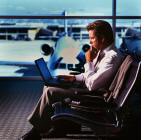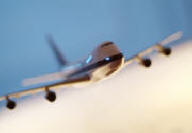www.RichardPresents.com
Vacation Travel
Quick Tips
Travel by Air
|
|
|
|
|
How to Have a Grand Time in the Skies
Motion sickness had been
a problem for centuries. In fact, it was even referred to as “camel sickness” in
the Bible, where the camel riders experienced nausea due to moderate
swaying.
With the advent of technology, motion sickness has evolved into many
forms like seasickness, carsickness, space motion sickness, and
air sickness.
Rides in today's jet liners are generally very smooth, but there are
still many people who suffer from airsickness. |
TO TOP
|
Generally, airsickness refers to a
feeling of nausea. Some of
the common signs of airsickness are loss of appetite, vertigo,
burping, stomach awareness, nausea, and increased swallowing and
salivation.

Contrary to most popular beliefs, airsickness is not a disorder. It
is just a normal response of the body to an unusual stimulus. Simply
put: airsickness is due to the disparity between what people see
with their eyes and the data that they get from the “vestibular
organs” of the ears.
So, it's a matter of the discrepancies between
what people see and what they feel. Thus, the end result is a
confusion of the brain’s regular processing of sensory awareness.
Here’s what you can try to help avoid airsickness:
1. Stress and other forms of anxiety should be stripped out.
Studies show that two of the common causes of airsickness are stress
and anxieties. It increases the probability of experiencing
airsickness. This is because the body will have more difficulty in
coping with the sudden change of environment. Emotional factors
trigger the brain to get more confused.
2. Before traveling, it's best to eat light
meals only. Large meals, especially those that have high salt
content are possible causes of airsickness.
3. While on board, try to stay put and avoid too
much moving within the aircraft. Motion is the number one factor why
airsickness occurs.
4. An airsickness pill such as Dramamine might be a good idea as
well. Check with the flight attendant for advice.
5. If possible, schedule the arrival at your destination in the
bright light of day.
Indeed, airsickness is not a big problem for most travelers. It is just a matter of
adjusting the body’s condition so as to avoid conflict of senses.
How to Get Jetlag-free Travel
 People who travel a lot experience jetlag. Athletes, who travel to
different countries for their tournaments, attribute their poor
performance to jetlag. Business people who go to various places for
business meetings and other matters, hold jetlag as responsible for
their bad days. Jetlag can affect not only the
physical condition of the body but the entire individual. People who travel a lot experience jetlag. Athletes, who travel to
different countries for their tournaments, attribute their poor
performance to jetlag. Business people who go to various places for
business meetings and other matters, hold jetlag as responsible for
their bad days. Jetlag can affect not only the
physical condition of the body but the entire individual.
Jetlag, basically, refers to the condition of the body being
disoriented. More often than not, jetlag is a result of crossing
time zones which affect the internal body clock of an individual.
Some of the common symptoms of jetlag are inability to sleep at
night, loss of drive, malaise, tiredness, inability to concentrate,
and headaches.
Generally, the severity of jetlag is dependent on the direction of
the travel. Most experts say that the occurrences of jetlag are
lesser when people travel westward than eastward. This is because
the body rhythm is extended up to 27 hours when a person flies
westward.
Moreover, the so-called “circadian rhythm” is greater than 24 hours
when a person travels westward. This is because the time of the day
is lengthened, thus, giving more time for the body to adjust.
 In reality, there are no quick fixes to “cure” the signs of jetlag.
However, there are ways to deal with it so you can feel more
comfortable after arriving at your new destination. In reality, there are no quick fixes to “cure” the signs of jetlag.
However, there are ways to deal with it so you can feel more
comfortable after arriving at your new destination.
Here’s how:
1. Staying outside during the day is recommended. This is because
a person’s body clock
is able to
adjust at a faster rate as it becomes accustomed to the new
surroundings. Usually, natural light aids in coping with jetlag.
2. Adjust bedtime schedules
to prevent the severity of jetlags. In this way, your body
clock will be better able to cope with the changes in the time
zones.
3. Start eating, sleeping, and doing
usual activities patterned to the local time zone of the new
destination.
4. For people who travel because of some important event it's best to travel way ahead of
time. This allows more time to
adjust and get accustomed to the new environment.
So, jetlag is not so much of a problem. It is just a matter of
preparation,
adjustment, and coping.
|
|